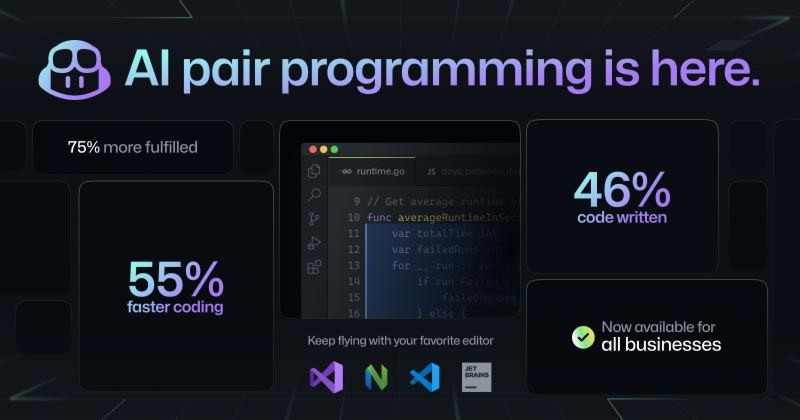| Announcing Copilot For Business |
| Written by Sue Gee | |||
| Wednesday, 15 February 2023 | |||
|
Copilot is GitHub's AI-powered "pair programmer" which uses OpenAI Codex to suggest code in real time in the editor of your choice. Its enterprise version, based on an improved AI model is now available. Until now GitHub's Copilot has only been targeted at individuals who pay $10 per month, or $100 per year, to use it. Even so it has been adopted on this basis by more than 400 organizations. According to GitHub research that we reported on last September, Copilot has made a very positive impact with 88% of developers surveyed reporting being productive and 75% feeling more fulfilled. The survey involved more than 2000 developers. A smaller empirical study of 95 developers assigned to two groups - coding with and without Copilot - found a speed increase of 55% using with Copilot. Bringing the productivity stats up to date the blog post announcing the general availability for Copilot for Business claims: an average of 46% of code being built using GitHub Copilot across all programming languages, and 61% among developers using Java. Copilot for Business is now open to enterprise users and introduces a simple self-serve purchasing model so that businesses can sign up for Copilot themselves and immediately assign seats, even if they don’t use the GitHub platform. The cost of Copilot for Business is $19 per user per month and comprises:
Speculating on the impact of introducing Copilot to large teams might have, Thomas Dohmke, GitHub's CEO writes: For an organization, developers fixing bugs faster means your product and supply chain is more secure. Developers manually writing less boilerplate over and over again means your teams are more productive and focused. Developers being able to learn and onboard new technologies means they can deliver better solutions for your customers. Ultimately, Copilot for Business gives developers the ability to build for tomorrow instead of spending all their time bogged down with the problems of today. Whether large developer teams will rush to adopt Copilot time will tell but the discussion of the GitHub announcement on Hacker News raised doubts that might impede it. These are largely to do with copyright issues and the risk of inadvertently using unlicensed code belonging to some owner with the resources to sue. The problem is that Copilot is an AI has been trained using massive amounts of real code from several publicly available sources, including GitHub's public repositories which use a wide variety of licenses. The first comment on Hacker News reads: Sadly, "simple license management" here just refers to "who in your organization has a license to use this tool", rather than "where did this code come from and what license is it under". This tool remains the equivalent of money laundering for violation of Open Source licenses (or software licenses in general). A respondent refers to the small print of the GitHub terms and conditions and the fact that Copilot for Business includes an $500k indemnity if you turn on excluding suggestions that match open source code. But then another person points to the caveats which cast doubt on being able to claim this indemnity. All-in-all the thread reflects a high level of concern with some contributors clearly stating they won't be using it in the short term:
A second blog post from Shuyin Zhao goes into more detail about the upgraded OpenAI Codex model being rolled out for Copilot for Individuals as well as Copilot for Business in order to deliver better results for code synthesis. Zhao introduces a new paradigm called Fill-In-the-Middle (FIM) which offers developers better craft prompts for code suggestions: Instead of only considering the prefix of the code, it also leverages known code suffixes and leaves a gap in the middle for GitHub Copilot to fill. This way, it now has more context about your intended code and how it should align with the rest of your program. FIM in GitHub Copilot consistently produces higher quality code suggestions, and we’ve developed various strategies to deliver it without any added latency. Also new in this version of Copilot is an AI-based vulnerability filtering system that blocks insecure coding patterns in real-time to make GitHub Copilot suggestions more secure. The model targets the most common vulnerable coding patterns, including hardcoded credentials, SQL injections, and path injections. Zhao explains: The new system leverages LLMs to approximate the behavior of static analysis tools—and since GitHub Copilot runs advanced AI models on powerful compute resources, it’s incredibly fast and can even detect vulnerable patterns in incomplete fragments of code. This means insecure coding patterns are quickly blocked and replaced by alternative suggestions. These enhancements will be welcomed by existing users of Copilot who presumably will be even more productive and more fulfilled using it. More InformationGitHub Copilot for Business is now available Related ArticlesGitHub Copilot Provides Productivity Boost GitHub Copilot - Your Programming Pal To be informed about new articles on I Programmer, sign up for our weekly newsletter, subscribe to the RSS feed and follow us on Twitter, Facebook or Linkedin.
Comments
or email your comment to: comments@i-programmer.info
|
|||
| Last Updated ( Wednesday, 15 February 2023 ) |




